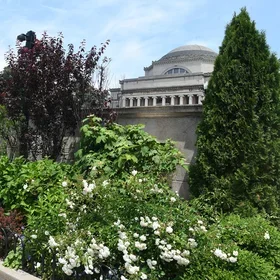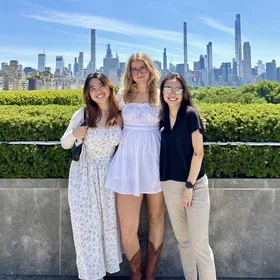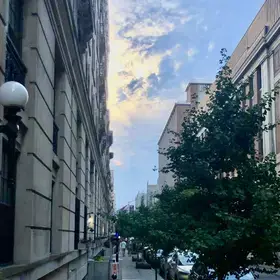About: Recent College Graduate from Washington
Area of Study: Applying to Graduate Sociology Programs
Columbia Program: Visiting-Postbaccalaureate Studies
Columbia Courses: The Social World (Summer Session B)
Gisela Lizbeth Medina Tovar graduated from Washington State University in Vancouver in May with a bachelor’s in social sciences and a minor in Spanish. A first-generation college graduate, daughter of immigrants, and DACA recipient, Tovar says she faces “high expectations and pressures,” but she also draws strength and purpose from her multifaceted identity. With plans to apply to graduate school and eventually earn a Ph.D., Tovar was intrigued by the Social World course offered during Columbia’s 2022 Summer Session.
“In the beginning, I was not certain if sociology was the area I wanted to pursue my doctorate, but now I am certain, and I have so many other things in mind that I wish to pursue. We can only become the change we wish to see when we seek to learn, conduct research, and study the issues and their possible solutions,” says Tovar. She reflects on her Columbia University Summer Session experience below.
What interested you in The Social World?
I was particularly intrigued by the class The Social World because it offered a sociological perspective on social issues in our modern world. Modern-day social issues have existed for a long time and are fascinating to examine because they provide insight into how patterns persist and inspire us to consider the many solutions that could be implemented. I have gained so much knowledge that I have realized how much I want to further pursue my interest in sociology in higher education and personally.
What’s your favorite part of the class?
The multiple discussions about various aspects of sociology, including race, class, and sexuality. Having different opinions and being permitted to share those opinions with one another is an important aspect of the discussions, not only because of the topic itself but also because of the different perspectives of the students involved. Professor Anna Hidalgo is such a great professor—she keeps the lectures relevant and engaging with stuff that is happening now. I can confidently say that she is a top professor from all my years in college. Her style is very enthusiastic, and she loves what she teaches and wants us to be creative about our learning and understanding while guiding us into the overall concepts of sociology.
Tell us a little about your family life. How do you balance your studies with helping to care for your brother?
In my family, I serve as the primary translator and communicator for my parents, as English is not their first language. I am also a caregiver for my twin brother, who has a neuromuscular disease. It can be challenging to balance the demands of my family life with my studies, but I have learned through trial and error how to do so successfully. It was challenging at times to be on FaceTime, thousands of miles away, explaining to him that he has to listen to others around him while I’m away.
What are your favorite things to do on campus and around the city?
One of my favorite things to do on campus is read. Recently, I went to a store called Kinokuniya near Bryant Park, where I picked up a few books. Since then, I have been enjoying reading on the benches under the trees. I also enjoy getting iced coffee from Joe’s and getting some studying done inside. As there is so much to see and do in the city as well as on campus, there is no time to see it all, but one can try.
How has the Summer Session helped you to reach your goals?
I have found the Columbia Summer Session to be more than I could have ever imagined. It has taught me how much fun learning can be. I have been inspired by each and every student I have met on campus as well as Professor Anna Hidalgo to continue my studies and look for solutions to social issues.
What advice would you give to students who are similar to you?
There are so many things that I have learned and had to teach myself, but if you are similar to me in any way, you should know that it is okay to ask for help. Sometimes we feel obligated to follow in the footsteps of our parents; however, it is also okay to follow your own path. You do not owe anyone explanations, nor do you need to justify your goals and ambitions to anyone, because you are ultimately doing it for yourself. Finally, never give up, even if it seems difficult at the moment. Take a moment to breathe, reevaluate your position, and remind yourself that it is okay to feel frustrated at times. Your goals are worth it in the long run, so don’t give up on yourself. I believe that you’ve got it, just like I believe I got it.


